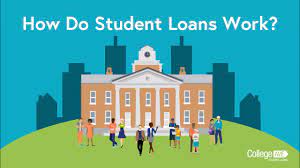Starting college is a big deal! It’s like opening a new and exciting chapter in your life. Picture yourself on the college campus, super excited to learn new things and shape your future. But, here’s the thing – money matters, especially when it comes to education. Many students have to figure out this money stuff by dealing with something called “student loans.”
How do student loans work? We’re going to dive into the details of student loans, but don’t worry, we’ll keep it simple. Together, we’ll explore how these loans work and make sure you have all the info you need. Think of it as a journey into the world of student financing. Our goal? To give you the knowledge you need to make your college experience awesome – not just in class, but also when it comes to money. Let’s get started and make your educational journey both smart and money-savvy!
How Is Student Loan Paid?
The way student loans are paid depends on the type of loan you have and the repayment plan you choose.
Federal Student Loans
Federal student loans are typically repaid through a loan servicer, which is a company that manages the billing and collection of federal student loans. You can find your loan servicer on the Federal Student Aid website.
There are four main repayment plans for federal student loans:
Standard Repayment Plan: This is the default plan for federal student loans. It requires you to make fixed monthly payments for a period of 10 years.
Graduated Repayment Plan: This plan starts with lower monthly payments that gradually increase over time. It is designed for borrowers with lower incomes.
Extended Repayment Plan: This plan extends the repayment period to 20 or 25 years. It is designed for borrowers with high levels of student loan debt.
Income-Driven Repayment Plan: This plan bases your monthly payments on a percentage of your discretionary income. It is designed for borrowers with significant financial hardship.
You can also make additional payments on your federal student loans at any time without penalty.
Private Student Loans
Private student loans are typically repaid directly to the lender. The repayment terms for private student loans will vary depending on the lender. However, most private student loans require you to make fixed monthly payments.
You may also be able to defer or forbearance your private student loans if you are experiencing financial hardship. Deferment allows you to temporarily postpone your payments, while forbearance allows you to temporarily make lower payments.
How Do Student Loans Work?
Student loans are financial tools designed to help individuals pay for their education expenses, such as tuition, books, and living costs. Here’s a simplified breakdown of how student loans typically work:
1. Types of Student Loans:
There are two main types of student loans: federal loans and private loans. Federal loans are backed by the government, offering more borrower protections and generally lower interest rates. Private loans are provided by private lenders and may have variable interest rates.
2. Application Process:
- Federal Loans: To apply for federal student loans, you need to fill out the Free Application for Federal Student Aid (FAFSA). This form helps determine your eligibility for various types of financial aid, including federal loans.
- Private Loans: Applying for private loans usually involves submitting an application directly to the lender. Approval and interest rates may depend on your credit history.
3. Loan Amounts:
- The amount you can borrow depends on factors like your year in school, dependency status, and the cost of attendance.
- Federal loans have annual and lifetime limits, while private loan limits vary based on the lender.
4. Interest Rates:
- Federal Loans: Interest rates for federal student loans are set by the government and can be fixed or variable. The rates can change annually.
- Private Loans: Private loan interest rates are determined by the lender and can be fixed or variable. Your credit score often influences the rate you receive.
5. Repayment Plans:
- Federal loans offer various repayment plans, including income-driven options that adjust your monthly payment based on your income.
- Private loans may have different repayment plans, but they often follow a standard repayment schedule.
6. Grace Period:
- After you graduate, leave school, or drop below half-time enrollment, there’s usually a grace period before you have to start repaying your loans.
- Federal loans typically have a six-month grace period, while private loans’ grace periods vary.
7. Repayment:
- Federal loans offer flexibility in repayment, and options like deferment or forbearance are available in case of financial hardship.
- Private loans may have fewer repayment options and may not offer the same borrower protections as federal loans.
8. Consequences of Non-Payment:
- Failing to repay student loans can have serious consequences, such as damaged credit, wage garnishment, or legal action.
How Does Student Loan Work In Nigeria?
The student loan system in Nigeria is still relatively new, having been established in 2023 through the Access to Higher Education Act. This act aims to provide access to interest-free loans for Nigerian students in tertiary institutions.
Eligibility
To be eligible for a student loan under the Access to Higher Education Act, students must meet the following criteria:
- Be a Nigerian citizen
- Be admitted to a full-time undergraduate or postgraduate program at an accredited tertiary institution in Nigeria
- Have a minimum JAMB score of 160 for undergraduate programs or a minimum CGPA of 3.0 for postgraduate programs
- Come from a low-income household
Loan Terms
The maximum loan amount that a student can borrow is N500,000 per academic session. This amount is intended to cover tuition fees, accommodation, and other education-related expenses.
Repayment of the loan begins two years after the completion of the mandatory National Youth Service Corps (NYSC) program. Students are required to repay 10% of their monthly income until the loan is fully paid.
Application Process
The application process for a student loan under the Access to Higher Education Act is as follows:
Complete an online application form on the website of the Education Loan Fund (ELF)
Submit the following documents to the ELF:
- Admission letter from the tertiary institution
- JAMB score or CGPA transcript
- Proof of indigene
- Letter of attestation from the Head of Department or Dean of Faculty
- Income statement of the student’s parents or guardians
Once the application is approved, the loan will be disbursed directly to the tertiary institution to cover the student’s tuition fees
Benefits of the Student Loan Scheme
The Access to Higher Education Act is expected to provide several benefits, including:
- Increased access to tertiary education for financially disadvantaged students
- Reduced financial burden on students and their families
- Improved enrollment rates and completion rates in tertiary institutions
- Enhanced human capital development in Nigeria
Challenges of the Student Loan Scheme
Despite its potential benefits, the student loan scheme in Nigeria faces a number of challenges, including:
- Limited funding for the Education Loan Fund
- High unemployment rate among Nigerian graduates
- Lack of awareness of the loan scheme among potential applicants
- Difficulty in tracking down graduates for loan repayment
The Nigerian government is working to address these challenges and ensure the success of the student loan scheme.
Tips for Managing Student Loan Debt
Borrow only what you need: Avoid borrowing more money than you can afford to repay.
Shop around for the best interest rates: Compare interest rates from different lenders before you take out a loan.
Make your payments on time: Late payments can damage your credit score and lead to additional fees.
Consider refinancing your loans: This could help you get a lower interest rate and save money over the life of your loans.
Explore loan forgiveness programs: There are a number of loan forgiveness programs available for borrowers who work in certain fields or meet certain income requirements.
Create a budget: This will help you track your income and expenses and make sure you are making enough money to cover your loan payments.
Set up automatic payments: This will help you avoid missing payments and incurring late fees.
Make extra payments whenever you can: This will help you pay off your loans faster and save money on interest.
Talk to your loan servicer: If you are having trouble making your payments, talk to your loan servicer. They may be able to help you find a solution, such as deferment or forbearance.
Get organized: Keep track of your loan balances, interest rates, and due dates. This will help you stay on top of your repayments and avoid defaulting on your loans.
Live within your means: It’s important to live within your means and avoid taking on too much debt. This will help you manage your student loan payments and avoid feeling overwhelmed.
Conclusion
Student loans can be a valuable tool for financing your education, but it is important to understand how they work and to borrow responsibly. By following these tips, you can manage your student loan debt effectively and avoid financial hardship.
Remember, education is an investment in your future, and student loans can help you achieve your goals. However, it is important to be informed about the terms and conditions of your loans and to make responsible borrowing decisions. With careful planning and financial management, you can successfully navigate the labyrinth of student loans and emerge with a brighter financial future.
FAQS
Can student loans be forgiven?
In some cases, federal student loans may be eligible for forgiveness through programs like Public Service Loan Forgiveness (PSLF) or Teacher Loan Forgiveness. Private loans generally do not offer forgiveness programs. Eligibility criteria apply, and it’s essential to understand the specific requirements for each program.
What happens if I can’t afford my student loan payments?
If you’re struggling to make payments on federal loans, you may be eligible for deferment, forbearance, or income-driven repayment plans. Private lenders may have their own options, so it’s important to contact them to discuss your situation. Ignoring payments can lead to serious consequences, such as damaged credit.

